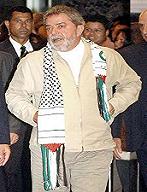
Arab and South American leaders have just completed a 2 day summit that was deemed a success, even before it took place. The idea of holding and hosting an Arab-South American summit was an initiative proposed by the Brazilian President Lula da Silva, following his first tour ever of the Middle-East, late last year. The initial idea was greeted with great enthusiasm from both Arab leaders and Arab League officials. The summit brought leaders from 14 South American countries and 22 Arab States together, to discuss, issues such as strengthening and promoting economic ties and trade, reducing the dependency of developing countries on the United States and Europe and finally, the hot topics of the Middle-East conflict, namely Iraq and the Palestine issue.
Arab and South American countries, have had long standing bi-lateral relations, that were dire need of renewal and strengthening. It is estimated that there are about 17 million Arabs living in South America, going back many generations. More Lebanese are said to live in Brazil than in Lebanon, a testament to the role played by Middle Eastern communities in South America. Practically all Arab nations are represented throughout Latin America, but Syrians and Lebanese make up the majority, having settled in their thousands from the 1890's onwards.
To say that this summit was a complete success or an utter failure is impossible, since this is the first summit of its kind. Theoretically seen this summit could be the beginning of new south-south partnership. The Arab world and the South America have a combined population of 600 million people; however, the trade between these two potentially very rich regions has been close to minimal. Speaking to Al Jazeera, Secretary-General of the Arab League Amr Moussa said, “Trade and investment between South American and the Arab world was not that significant… but since the initiative by President Lula, trade and investment between Brazil and the Arab world has increased by a fifth.”
However, this unique summit was hampered severely by two things. First, was the American Administration’s position concerning the holding of such a summit, as well as the declarations it would make? Secondly, the absence of 15 Arab leaders from this summit, more then two thirds of the Arab leaders, did not take part in this summit, for no apparent or concrete reason. Such a glaring absence by Arab leaders is very counterproductive and even more so, paints a fairly bad picture of these leaders. Their absence leaves one very important question open, since no credible reason was given, why else did the 15 Arab leaders not take part. Could it have something to do with US pressure?
The Arab-South American summit which was initially intended to be an economic summit quickly turned political. Peruvian President Alejandro Toledo said, “The idea of this meeting was to explore possibilities for trade and investment, not to deal with political issues.” But with the Arab world being in virtual turmoil, over an ever worsening Iraq crisis, as well as the ever lingering Palestine question, it was hard to avoid any political discourse. The Kuwait foreign minister said, “How can you have trade and development when you have countries under occupation,” which is a very good point to be made. However, having such comments come from only one of the closet allies of the US in the Middle-East is hardly satisfying.
The Summit ended with a joint declaration from Arab and South American leaders, which focused mainly on the Palestinian-Israeli conflict and called for the creation of a Palestinian state that would coexist peacefully alongside Israel, and called on Israel to withdraw from all territories occupied since the 1967 Arab-Israeli War and dismantle all settlements, including those in east Jerusalem. Such summits are a very good initiative taken by world leaders, which should pursued, supported and promoted. Arabs and Latin Americans may not be able to wreak the benefits of such conference in the short run, but it is almost certain that they will wreak the benefits of further and better Arab-South American relations in the future.







